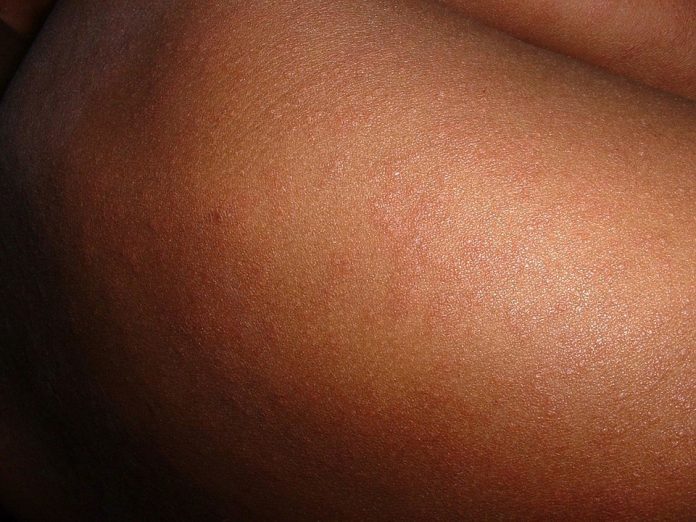
TRENTON – A third case of measles has been discovered in an Ocean County man, prompting the State Department of Health to issue a Public Health Alert to all who might have come in contact with him between March 9 and March 14.
Earlier this year, there was a spread of the disease among a few dozen cases. New cases eventually stopped showing up, so that outbreak was considered contained. These three new patients are now a new outbreak.
The state is warning that you might be at risk of this potentially fatal disease if you were at the following locations at the following times:
Congregation Bais Tefilla, 33 East 8th St, Lakewood
- March 9, 2019 from 8:30 a.m. and 1:45 p.m.
- March 10 from 7:30 a.m. to 11:00 a.m.
- March 11 from 7:30 a.m. to 11:00 a.m.
- March 13 from 7:30 a.m. to 11:00 a.m.
- March 14 from 7:30 a.m. to 11:00 a.m.
Beth Medrash Govoha, Bais Yitzchok Hall, Lakewood
- March 10 from 9:30 a.m. to 4:00 p.m.
- March 11 from 9:30 a.m. to 4:00 p.m.
- March 13 from 12:45 p.m. to 4:00 p.m.
Beth Medrash Govoha, Yoshon Hall, Lakewood
- March 10 from 4:00 p.m. to 9:30 p.m.
- March 11 from 4:00 p.m. to 9:30 p.m.
- March 12 from 5:30 p.m. to 9:30 p.m.
Beth Hamedrash Zichron Binyomin, 701 Princeton Ave, Lakewood
- March 9 from 3:00 p.m. to 9:30 p.m.
- March 10 from 9:30 p.m. to midnight
- March 11 from 9:30 p.m. to midnight
- March 13 from 10:45 p.m. to 1:15 a.m. on March 14
Lake Terrace Hall, 1690 Oak St, Lakewood
- March 11 from 10:00 p.m. to 12:45 a.m. on March 12
Kol Shimshon, 323 Squankum Rd, Lakewood
- March 12 from 8:00 a.m. to 11:00 a.m.
- March 12 from 9:00 p.m. to 11:15 p.m.
The Department of Health is recommending that anyone who visited the locations listed above during these dates and times should contact a health provider immediately to discuss potential exposure and risk of developing the illness. However, don’t visit a medical office or emergency department without first calling so they can prepare for your arrival. Measles is highly contagious, and just showing up without letting staff know may endanger other patients and medical staff. If you have been exposed, you are at risk if you have not been vaccinated or have not had measles. Individuals potentially exposed, if infected, could develop symptoms as late as April 7.
An investigation is being conducted to determine if there is any link between this current outbreak and the previous one, or any outbreaks in other states.
Measles symptoms include rash, high fever, cough, runny nose and red, watery eyes. It can cause serious complications such as pneumonia and encephalitis (swelling of the brain). Measles infection in a pregnant woman can lead to miscarriage, premature birth or a low-birth-weight baby. Measles is easily spread through the air when someone coughs or sneezes. People can also get sick when they come in contact with mucus or saliva from an infected person.
Anyone who has not been vaccinated or has not had measles is at risk if they are exposed.
“Two doses of measles vaccine are about 97 percent effective in preventing measles,” said Dr. Christina Tan, state epidemiologist.
“We urge everyone to check to make sure they and their family members are up-to-date on measles/mumps/rubella (MMR) vaccine and all other age-appropriate immunizations. Getting vaccinated not only protects you, it protects others around you who are too young to get the vaccine or can’t receive it for medical reasons. If you’re planning an international trip, the World Health Organization recommends that adults or adolescents unsure of their immune status get a dose of measles vaccine before traveling,” Dr. Tan added.
Before international travel:
- Infants 6 through 11 months of age should receive one dose of MMR vaccine. Infants who get one dose of MMR vaccine before their first birthday should get two more doses (one dose at 12 through 15 months of age and another dose separated by at least 28 days).
- Children 1 year and older should receive two doses of MMR vaccine, separated by at least 28 days.
- Teenagers and adults who do not have evidence of immunity against measles should get two doses of MMR vaccine separated by at least 28 days.






